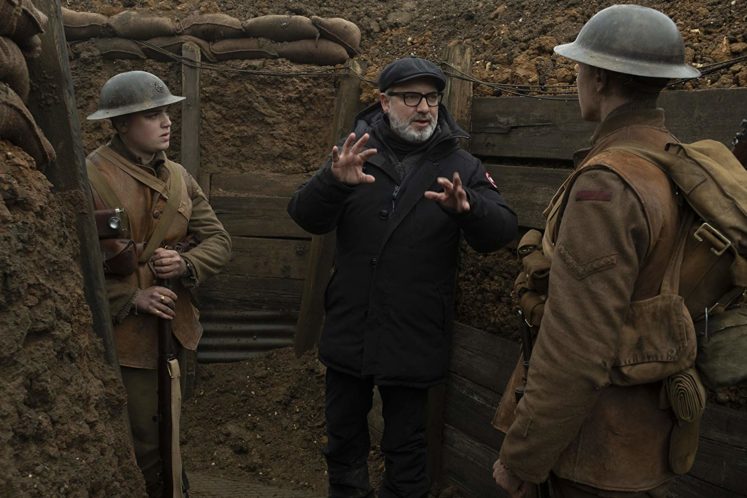In his new film 1917, Sam Mendes salutes countless soldiers who fought during World War I, although the inspiration came from only one — his own grandfather.
The harrowing experiences of Alfred Mendes hatched the idea for the Oscar-winning director, who crafted a narrative about two British messengers lost in the fog in No Man’s Land in his most personal project to date.
“He went to war when he was 17, but didn’t talk about it until he was in his seventies,” Mendes said of his grandfather. “The war was savage and relentless and chaotic and messy. The reality of that emerges more in first-person accounts and diary entries. The public perception of the war at the time was controlled by the government and the press as being a good war in order to keep people going. Somebody like my grandfather enlisted into a war that he imagined to be totally different, and was shocked when he got there.”
The film follows two fictionalized lance corporals in the British Army — Schofield (George MacKay) and Blake (Dean-Charles Chapman) — assigned to deliver a message across enemy lines that one of their battalions, which includes Blake’s own brother, is about to walk into a trap. Their perilous journey forces them to confront the horrors of combat firsthand while their loyalty to the mission and each other is tested.
“It was a generation, world-defining war that was not defined by combat, but by death,” Mendes said during a recent stop in Dallas. “It starts as the last old-fashioned war and ends as the first contemporary war with machine guns and tanks and bombs and weapons of mass destruction. You could kill a man 1,000 yards away, but you can’t communicate with a man 20 yards away.”
Once he conceived the story as taking place during two hours of real time, Mendes knew he wanted it to resemble a single, continuous tracking shot. Such ambition and audacity presented plenty of logistical challenges — and long takes — for the cast and crew.
“You can really get lost in it and fully immersed,” Chapman said. “Everything seemed so realistic. You can stand out there and genuinely be scared. In the German bunker, it was pitch-black and eerie and really creepy.”
That stems from Mendes (American Beauty) desiring an intimate and visceral method to dramatize the first World War, which was more static than World War II a generation later. In other words, the lack of well-defined enemies and global movement is one reason why it hasn’t been subject to nearly the same level of cinematic attention in comparison.
“Finding a way to express the war visually is difficult,” Mendes said. “We had to try and find a moment in the war when it was possible to take a journey, and there aren’t many. Through the keyhole of these two men’s experiences, you can begin to understand the scale of the destruction and the vastness of the landscape.”
The actual shooting schedule was condensed into a few weeks earlier this year, but Mendes and the actors rehearsed with a camera in full costume for months prior to production. They marked out the trenches and buildings in open fields, and then constructed the sets very specifically.
“We went quite fast, relatively speaking, as long as the weather was OK,” Mendes said. “The boys were so familiar with it. It was in their muscle memory. It was a combination of amazing precision with what the camera was doing and more spontaneity on the other side. We wanted freedom from the actors. I didn’t want it to feel robotic, so there were times when I’d throw something new in.”
The supporting cast includes Colin Firth, Benedict Cumberbatch, and Mark Strong. But the film’s emotional anchors are MacKay (Captain Fantastic) and Chapman (The King), who were able to maintain a positive attitude although each day required slogging through mud, wreckage, and oppressive conditions.
“Even though it was pretty grim at times, no one complained,” Mendes said. “It’s pretty impossible to complain when you’re in the trenches for three weeks and these guys were living there for three years. We get to go and have a shower at night. It’s quite sobering. Nobody ever moaned about it. That seemed completely inappropriate. You look around and you’re just thankful we’re not living through this for real.”





